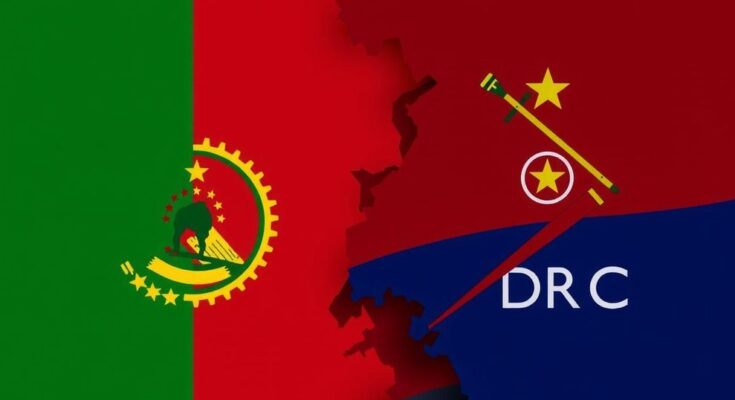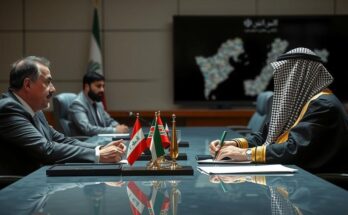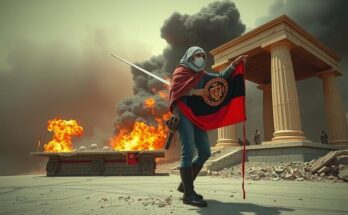Resurgence of violence in eastern DRC has raised alarm for Angola, undermining ceasefire efforts amid ongoing mediation between DRC and Rwanda. Clashes were reported involving local defense groups and the M23 rebels, exacerbating the humanitarian crisis.
Renewed hostilities in the eastern region of the Democratic Republic of Congo (DRC) have prompted the Angolan government to express alarm, particularly as efforts were underway to establish a long-term ceasefire following a brief respite in fighting over the past month. In a press release issued on Tuesday, Angolan officials condemned the resurgence of violence as a blatant breach of the agreements reached during the ministerial meeting on July 30 and the subsequent ceasefire that took effect on August 4. Angola has been actively mediating between the DRC and Rwanda, both of which accuse one another of supporting rebel factions that threaten regional stability. Their most recent diplomatic engagement occurred two weeks ago in Luanda, during which both nations reaffirmed their commitment to seeking a peaceful resolution to the conflict. Kinshasa had assured that the FDLR rebels—viewed as adversaries by Rwanda—would not receive support from the Congolese army (Fardc), contingent upon Rwanda’s withdrawal of support for the M23 rebel group. The Angolan government has categorically rejected and condemned the recent violent clashes, emphasizing that such actions undermine ongoing peace efforts in the eastern DRC. They urged all conflict parties to adhere to the ceasefire, as discussed during the ministerial meeting on September 14. Reports indicate that violent confrontations occurred over the weekend around the village of Kalembe, where the Wazalendo self-defense group, aligned with the Congolese army, engaged in conflict with the M23 rebels. Local sources claim that the Congolese forces succeeded in regaining control over the town. Juvenal Munubo, a former member of parliament from Walikale, remarked, “I have learnt that the NDC Rénové (Kivu armed group), with logistical support from the Fardc, has regained control of the town of Kalembe. I call on the Fardc and the patriotic resistance fighters to consolidate this victory.” Meanwhile, MP Willy Mishiki suggested that there are intentions among the rebels to expand their control to three other provinces: South Kivu, Tshopo, and Maniema. Despite the ongoing tensions, there has been a semblance of calm since early August that initially enabled some displaced individuals to consider returning home, seeking refuge from the dire conditions of overcrowded displacement camps. In terms of political negotiations, the DRC has firmly ruled out any discussions with the M23. However, dialogues between the DRC and Rwanda are progressing. The foreign ministers of both nations convened on October 12 for their fifth meeting, where they agreed to continue addressing outstanding security matters in line with the draft peace agreement facilitated by Angola. Angola has reiterated the need to refrain from actions that could exacerbate the conflict, further complicating the dire humanitarian landscape in eastern DRC. They reaffirmed their commitment to pursuing a permanent resolution through the Luanda Process, led by President João Lourenço, under the African Union’s auspices. In a notable development, Kigali and Kinshasa have agreed to establish an ad hoc verification mechanism to oversee peace efforts, with the structure set to be officially inaugurated in Goma, DRC, by November 5, 2024. According to reports, at least 14 civilians were injured in the latest clashes, prompting many to flee their homes. The United Nations High Commissioner for Human Rights has projected that approximately 940,000 individuals may be displaced in 2024 alone, raising the cumulative total of displaced persons in the DRC to nearly seven million. The ongoing conflict and resulting humanitarian crisis have led to severe overcrowding in North Kivu, and civilians continue to suffer from serious human rights violations, including incidents of sexual violence.
The Democratic Republic of Congo has been embroiled in conflict for decades, exacerbated by various local, regional, and international factors, including the presence of multiple armed groups and complex geopolitical dynamics. Angola has taken on the role of a mediator, particularly amidst tensions between the DRC and Rwanda, both of which have contentious histories and mutual accusations of supporting rebel factions against each other. Efforts to establish ceasefires and negotiate peace agreements have been ongoing but marked by frequent escalations in violence, deeply affecting humanitarian conditions in the region. Recent diplomatic meetings have sought to address security issues and humanitarian concerns, while the humanitarian situation remains critical, with numerous displaced individuals at risk of further violence.
The renewed fighting in the eastern region of the Democratic Republic of Congo has drawn significant concern from Angola as it undermines ongoing efforts to stabilize the situation through diplomatic negotiations and ceasefire agreements. The situation highlights the fragility of peace efforts in the DRC amidst complex regional tensions, particularly between the DRC and Rwanda. With hundreds of thousands at risk of displacement, the international community and regional leaders must work collaboratively to mitigate the conflict’s impact and support a sustainable resolution to ensure safety and respect for human rights.
Original Source: www.theeastafrican.co.ke




